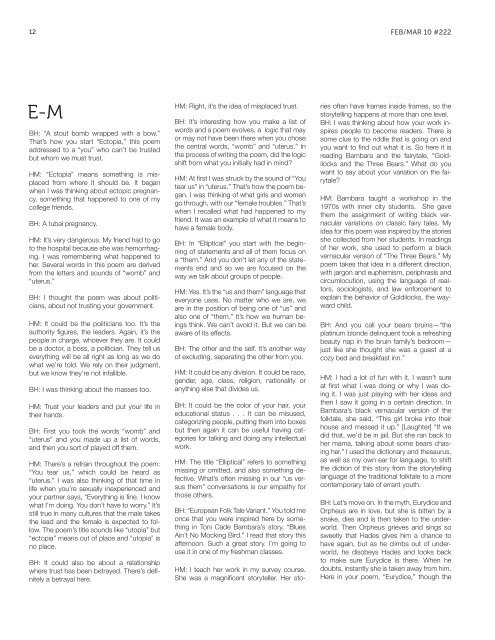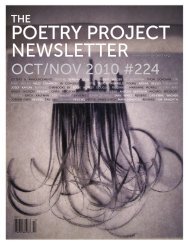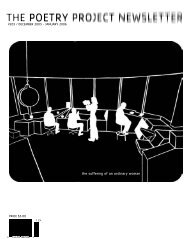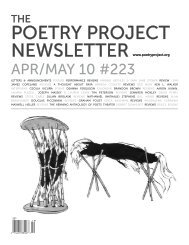Create successful ePaper yourself
Turn your PDF publications into a flip-book with our unique Google optimized e-Paper software.
12 FEB/MAR 10 #222<br />
E-M<br />
BH: “A stout bomb wrapped with a bow.”<br />
That’s how you start “Ectopia,” this poem<br />
addressed to a “you” who can’t be trusted<br />
but whom we must trust.<br />
HM: “Ectopia” means something is misplaced<br />
from where it should be. It began<br />
when I was thinking about ectopic pregnancy,<br />
something that happened to one of my<br />
college friends.<br />
BH: A tubal pregnancy.<br />
HM: It’s very dangerous. My friend had to go<br />
to the hospital because she was hemorrhaging.<br />
I was remembering what happened to<br />
her. Several words in this poem are derived<br />
from the letters and sounds of “womb” and<br />
“uterus.”<br />
BH: I thought the poem was about politicians,<br />
about not trusting your government.<br />
HM: It could be the politicians too. It’s the<br />
authority figures, the leaders. Again, it’s the<br />
people in charge, whoever they are. It could<br />
be a doctor, a boss, a politician. <strong>The</strong>y tell us<br />
everything will be all right as long as we do<br />
what we’re told. We rely on their judgment,<br />
but we know they’re not infallible.<br />
BH: I was thinking about the masses too.<br />
HM: Trust your leaders and put your life in<br />
their hands.<br />
BH: First you took the words “womb” and<br />
“uterus” and you made up a list of words,<br />
and then you sort of played off them.<br />
HM: <strong>The</strong>re’s a refrain throughout the poem:<br />
“You tear us,” which could be heard as<br />
“uterus.” I was also thinking of that time in<br />
life when you’re sexually inexperienced and<br />
your partner says, “Everything is fine. I know<br />
what I’m doing. You don’t have to worry.” It’s<br />
still true in many cultures that the male takes<br />
the lead and the female is expected to follow.<br />
<strong>The</strong> poem’s title sounds like “utopia” but<br />
“ectopia” means out of place and “utopia” is<br />
no place.<br />
BH: It could also be about a relationship<br />
where trust has been betrayed. <strong>The</strong>re’s definitely<br />
a betrayal here.<br />
HM: Right, it’s the idea of misplaced trust.<br />
BH: It’s interesting how you make a list of<br />
words and a poem evolves, a logic that may<br />
or may not have been there when you chose<br />
the central words, “womb” and “uterus.” In<br />
the process of writing the poem, did the logic<br />
shift from what you initially had in mind?<br />
HM: At first I was struck by the sound of “You<br />
tear us” in “uterus.” That’s how the poem began.<br />
I was thinking of what girls and women<br />
go through, with our “female troubles.” That’s<br />
when I recalled what had happened to my<br />
friend. It was an example of what it means to<br />
have a female body.<br />
BH: In “Elliptical” you start with the beginning<br />
of statements and all of them focus on<br />
a “them.” And you don’t let any of the statements<br />
end and so we are focused on the<br />
way we talk about groups of people.<br />
HM: Yes. It’s the “us and them” language that<br />
everyone uses. No matter who we are, we<br />
are in the position of being one of “us” and<br />
also one of “them.” It’s how we human beings<br />
think. We can’t avoid it. But we can be<br />
aware of its effects.<br />
BH: <strong>The</strong> other and the self. It’s another way<br />
of excluding, separating the other from you.<br />
HM: It could be any division. It could be race,<br />
gender, age, class, religion, nationality or<br />
anything else that divides us.<br />
BH: It could be the color of your hair, your<br />
educational status . . . It can be misused,<br />
categorizing people, putting them into boxes<br />
but then again it can be useful having categories<br />
for talking and doing any intellectual<br />
work.<br />
HM: <strong>The</strong> title “Elliptical” refers to something<br />
missing or omitted, and also something defective.<br />
What’s often missing in our “us versus<br />
them” conversations is our empathy for<br />
those others.<br />
BH: “European Folk Tale Variant.” You told me<br />
once that you were inspired here by something<br />
in Toni Cade Bambara’s story, “Blues<br />
Ain’t No Mocking Bird.” I read that story this<br />
afternoon. Such a great story. I’m going to<br />
use it in one of my freshman classes.<br />
HM: I teach her work in my survey course.<br />
She was a magnificent storyteller. Her sto-<br />
ries often have frames inside frames, so the<br />
storytelling happens at more than one level.<br />
BH: I was thinking about how your work inspires<br />
people to become readers. <strong>The</strong>re is<br />
some clue to the riddle that is going on and<br />
you want to find out what it is. So here it is<br />
reading Bambara and the fairytale, “Goldilocks<br />
and the Three Bears.” What do you<br />
want to say about your variation on the fairytale?<br />
HM: Bambara taught a workshop in the<br />
1970s with inner city students. She gave<br />
them the assignment of writing black vernacular<br />
variations on classic fairy tales. My<br />
idea for this poem was inspired by the stories<br />
she collected from her students. In readings<br />
of her work, she used to perform a black<br />
vernacular version of “<strong>The</strong> Three Bears.” My<br />
poem takes that idea in a different direction,<br />
with jargon and euphemism, periphrasis and<br />
circumlocution, using the language of realtors,<br />
sociologists, and law enforcement to<br />
explain the behavior of Goldilocks, the wayward<br />
child.<br />
BH: And you call your bears bruins—“the<br />
platinum blonde delinquent took a refreshing<br />
beauty nap in the bruin family’s bedroom—<br />
just like she thought she was a guest at a<br />
cozy bed and breakfast inn.”<br />
HM: I had a lot of fun with it. I wasn’t sure<br />
at first what I was doing or why I was doing<br />
it. I was just playing with her ideas and<br />
then I saw it going in a certain direction. In<br />
Bambara’s black vernacular version of the<br />
folktale, she said, “This girl broke into their<br />
house and messed it up.” [Laughter] “If we<br />
did that, we’d be in jail. But she ran back to<br />
her mama, talking about some bears chasing<br />
her.” I used the dictionary and thesaurus,<br />
as well as my own ear for language, to shift<br />
the diction of this story from the storytelling<br />
language of the traditional folktale to a more<br />
contemporary tale of errant youth.<br />
BH: Let’s move on. In the myth, Eurydice and<br />
Orpheus are in love, but she is bitten by a<br />
snake, dies and is then taken to the underworld.<br />
<strong>The</strong>n Orpheus grieves and sings so<br />
sweetly that Hades gives him a chance to<br />
have again, but as he climbs out of underworld,<br />
he disobeys Hades and looks back<br />
to make sure Eurydice is there. When he<br />
doubts, instantly she is taken away from him.<br />
Here in your poem, “Eurydice,” though the

















